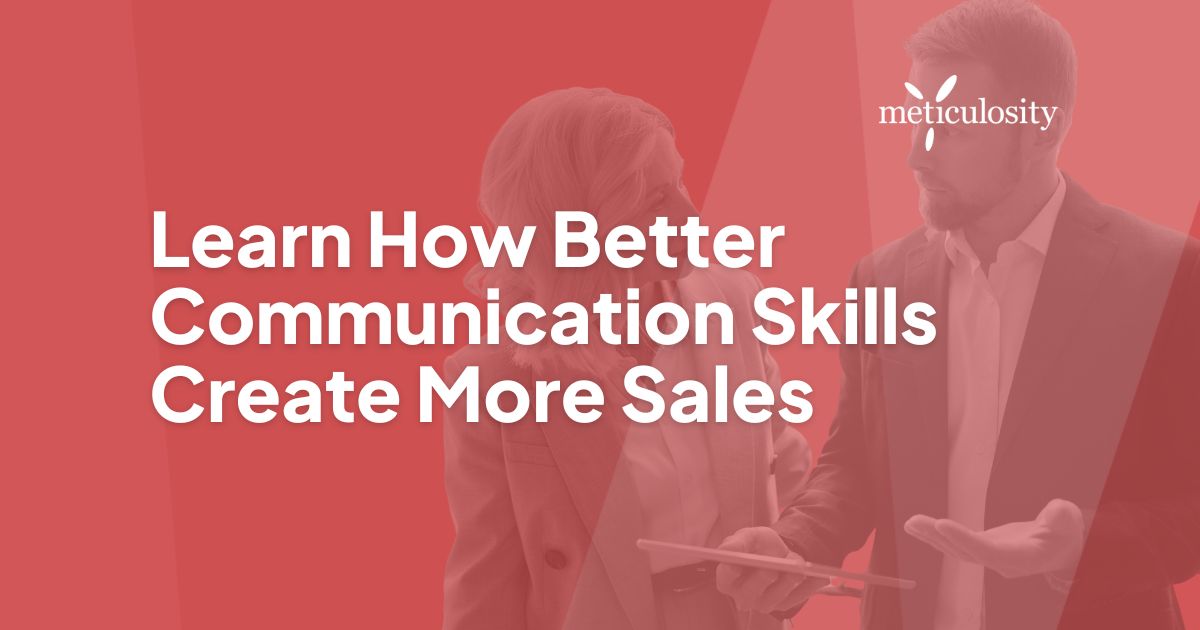What Are Sales Communication Skills?
Sales communication skills are basic requirements that will help any rep succeed in their role. Improving communication skills should be a long-term goal for any salesperson and will help shape an organization's sales strategy plan.
Sales Communication Skills
- Set expectations
- Practice active listening
- Body language & facial queues
- Voice & tone
- Learn to empathise
- Don’t guess or assume
- Don’t speak over or down
- Don’t sell
- Prospect check-in
- Be the expert not a know-it-all
- Be conversational
- Be inquisitive
- Be prepared
- Be focused
- Be persistent
- Be firm
- Be specific
- Be helpful
- Be a resource & trusted advisor
- Be confident
- Be honest
What is Sales Communication?
Sales communication is the ability to create a meaningful dialogue with a prospect to uncover their business needs and goals. It’s also the ability to show market expertise, thought leadership and the benefits of engaging with your organization.
It may seem obvious that you need to communicate with your prospects to make a sale - true. However, the skills required to be successful are much more than being a smooth talker.
Importance of Communication in Sales
The ability for a salesperson to gather information such as the prospects goals or challenges requires good communication. If a prospect is unwilling to share their pain points, how can you help them? If they don’t communicate their goals, how could you know what success looks like? Therefore, it’s the job of the salesperson to address resistance and gain the prospect’s trust.
There’s a good communication skill that will get your prospect talking and sharing is with the “Give and Get” technique. This offers something of value in advance for instance…
“Mr. prospect, did you know that adding a Call to Action to your blog posts will increase lead flow?”
It may seem obvious or even trivial to suggest right? But, I do this all the time with 100% accuracy. Every time I offer something of value, the prospect feels “compelled” to return the favor by sharing business intel - it’s gold.
Mind you, the technique is not meant to be trickery. It’s a mechanism to overcome initial resistance and help lower their guard.
Once you gain a prospect’s trust you can uncover their needs, goals and challenges. Then you can position the “right solution” that’s tailor made just for them.
21 Essential Communication Skills for Salespeople
1. Set expectations
Setting good expectations at the start of any sales conversation helps sets the tone and lets the prospect know we’re all here to help them succeed.
Typically, I’ll set the expectations right after building rapport by outlining the call or meeting agenda. I’ll also “check-in” with the prospect asking if there’s anything else they’d like to cover to gain their buy-in.
2. Practice active listening
You should only do 20-30% of the talking. That's right less talking and more listening.
Remember the meeting is all about your prospect so you should be listening intently. Don’t be so quick to speak as you may prevent a useful fact from entering the conversation.
A few skill tips to help the dialogue:
- Ask open-ended questions to start the conversation
- Take good notes on relevant facts
- Slow the conversation and reaffirm the facts
- Try to quote the prospects own words and reuse them in context (this really shows you’re listening)
- Ask follow-up questions to maintain a good pace and expand on important points
3. Body language & facial cues
Body language affects how others interpret what we’re saying. So, delivery of your words will have a greater impact on your audience when you have good posture and you’re making good eye contact.
Just as important are the prospect’s facial cues that communicate volumes. Watching out for changes in facial expression can help you navigate the conversation better. If you see someone glossy-eyed, squinting or face scrunching you may have lost them. Slow down, back up or change topic to get the prospect engaged again.
In, any sales setting it's important to show good body language and be mindful of the prospect's body language as well. So, that means chin up, shoulders back and smiling.
You need to send a positive message at all times.
4. Voice & tone
Carefully selecting the right words affects how people engage you. Equally important is how you deliver those words. I like to project my voice, have an upbeat tone and maintain a nice even speed. This allows my sales audience to hear me clearly (without being loud) and at a pace they can absorb comfortably.
On the flip side, pay close attention to how your prospect is speaking and align yourself with their communication style. Often, I’ll find they fall into casual or formal type of speaking. Once I pickup up on that, I’ll adjust.
5. Learn to empathise
Being empathetic can be tricky in sales but necessary in creating a bridge to your prospects world. They want to know that you understand them which requires you to “try” to understand their point of view even if you have no direct experience.
When you learn to empathise with the sales prospect, they'll see you as caring and genuinely concerned for their prosperity. They’ll also see you as a potential partner and that closes deals.
6. Don’t guess or assume
Making a guess within routine sales communication puts you at risk of being wrong or not 100% right. This will cost you trust points you may never get back.
You can’t possibly know everything about sales situation. So, when you don’t know something, don’t guess. Simply say… “That’s a great question. So, that I can get you the best answer, let me check with my technical lead and get back to you tomorrow. Is that OK?”. People will respect you more.
In addition, don’t guess at or assume you know a prospect’s business - it make you sound pompous.. I’ve found that no matter how similar one client is to the next, their business situation, needs and challenges are all unique. So, check yourself and just ask a few probing questions.
7. Don’t speak over or down
Not so much a skill but a matter of good communication behaviour. Don’t be in such a hurry to speak that you’re waiting to cut into conversation. It will only devalue what the person has just finished saying and they’ll feel like you’re trying to speak over them.
It should go without saying you need to be courteous. With that, it’s important to speak at someone’s level without making them feel inadequate. The details of your product or service may be complex. So, speak in simple terms without the jargon so they don’t feel talked down to.
8. Don’t sell
Yikes are you trying to sell something on a sales call or meeting? It’s highly disrespectful trying to sell something without first translating their business needs. It also makes you sound like every other salesperson trying to peddle their wares. Communicate good value and pivot from there.
9. Prospect check-in
This is one of my favorite skills… the check-in. I use at the beginning, middle and end of every conversation. Just like it sounds, I check-in with the prospect to be sure we’re on the same page, if they’d like to add anything to the conversation or maybe take a next step. Here are a few examples:
- Is there anything else you’d like me to cover in today’s meeting?
- (after explaining something) Does that make sense?
- Would you like to learn more about how our product or service can help you achieve your goals?
10. Be the expert not a know-it-all
In, sales or in life people don’t like a know-it-all. Why? Because they only learn the basics but try to pass themselves off as an expert. This is dangerous in sales as people will pick up on your gaps of knowledge and will make you look like a hack.
However, people will gravity to the experts. So, it’s in your best interest to study the business market of your prospects. Get to know their industry, what makes them tick and common challenges. When you gain a deeper insight into your prospect’s world you can communicate on their level and they’ll welcome you.
11. Be conversational
This is a handy little skill that comes easier to some. It’s important to know that even though you’re asking questions, it’s not an interrogation. Being conversational helps lighten the overall mood which makes for easier conversation.
12. Be inquisitive
Being inquisitive is an important sales skill and means taking a meaningful interest into the prospect’s organization by asking good questions. It can also mean asking them to expand on a topic you found interesting or relevant. This is a great sales approach as your natural curiosity allows the prospects to talk more about themselves and the work they do.
13. Be prepared
This can’t be overstated. If you’re not fully prepared for a meeting, phone call or presentation your delivery will feel scattered and forced. Trust me, lack of preparation will affect your confidence and the prospect will read it and you’ll lose valuable trust points.
14. Be focused
Having a clear focus in your agenda and in your dialogue will help you reach your sales meeting goals. So stay on point and stay on topic. Otherwise you may find yourself in the weeds talking tactics before you present a solution.
Having focus also means to be actively engaged in the running conversation so you don’t miss important details. Text messages, email and social media aren’t going anywhere so this means putting down other devices and being distraction free for the entirety of your meeting. Don’t get caught out not paying attention!
15. Be persistent
For years I thought my constant emails and phone calls were like stalking… and they kinda were. That’s because my communications were like:
“Hey Mr. Smith, this is Eric and I’m just doing a quick follow up…” - how lame!
These days I exercise “Professional Persistence” which is quite a bit different because I customize each communique per prospect to delivers new value. So, I deliver 4 phone calls and 4 emails across 12 days. They show that I’m serious about speaking with them and I have something earth-shattering to say that will help them in business.
People are just plain busy these days. But believe me, persistence pays off. People will generally call you back after the 5th - 7th touch. So, professional persistence wins.
16. Be firm
In my early days of sales I was a bit of a pushover. I wasn’t clear on my delivery so I was an easy target for manipulation of deal terms and usually gave away too much for too little. Hey, I was desperate for the sale so I let the prospect dictate and it always came back to bite me.
Over course it’s important to be fair but you need to stand firm. If the opportunity before you is not a fair nor equitable one, then it’s better to pass early on than to find disaster afterwards.
17. Be specific
A seasoned communicator knows when to stop fluffing and when to dial in the specifics. So, being as specific as possible during your sales process keeps you out of the fringe areas.
If your product only does X then strengthen that position and don’t embellish. Trust me, you need not speak in gray terms to make a sale if you have a strong value proposition.
18. Be helpful
Being helpful should be the cornerstone of your sales mission. Many organizations believe that the purpose of their business is to sell their product or service but the sale is merely an outcome. If that’s indeed the case with you then are you nothing more than a commodity?
It’s fine if the closing is a sales goal, but don’t let it define your organization nor your sales culture. I personally flipped the switch many years ago when I adopted the Inbound philosophy.
Now the purpose for which we run our agency is to be helpful and human. So, we communicate that message into every print asset, digital ad, email and conversation.
19. Be a resource & trusted advisor
Being a resource means being that person who shares without requiring or pressuring for reciprocation.
You might share templates, videos or blog posts you think might be of value and help the prospect without asking for anything in return. It may seem counterintuitive for sales but will forever change the way a person sees you… not as a salesperson, but as a resource.
Part of being helpful your job role is being a trusted advisor even if there is no opportunity for sale at that time. Often, prospective customers don’t know what they don’t know and rely on a third party for advice. Be that person of trust they can turn to without them feeling the need to buy anything for answers for one day that relationship will bear fruit.
20. Be confident
This is a communication skill that grows with experience. Lack of confidence will translate into every utterance of speech, email, voicemail, etc.
Don't shy away from making your calls or getting into a big opportunity presentation.
Practice definitely makes perfect. The more you do, the more you’ll find your confidence.
21. Be honest
This really need not be said but here I go… you absolutely, positively need to be honest 100% of the time in all sales communications. This is a must with no middle ground.
Even amid a mistake, you need to own it. I’ve made plenty and what I can tell you is that honesty always wins even if you get fired or you don’t get the sale. In the end you can rest easy knowing your conscience is clear.
Remember, you and your words represent your organization. Your gold standard reputation years or even a lifetime to build and only moments to destroy. Keep it legit at all times.


/Imported_Blog_Media/sales-communication-skills-1.jpg)






